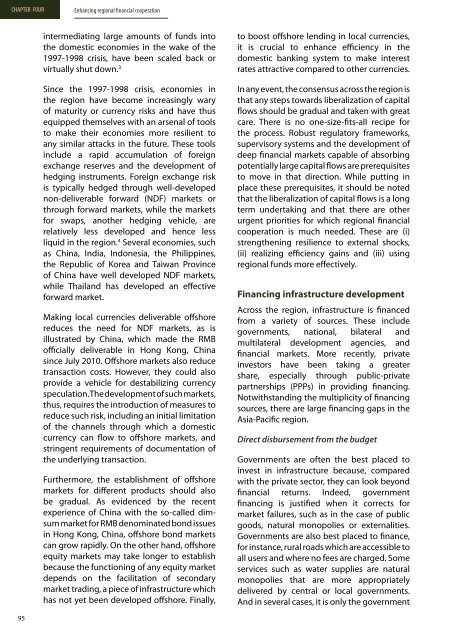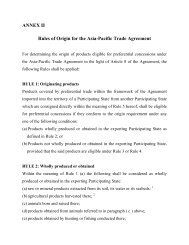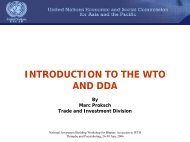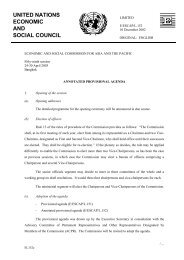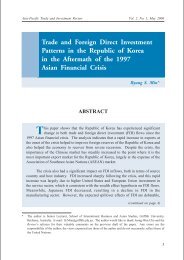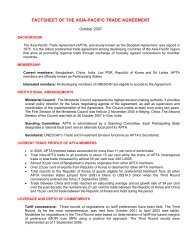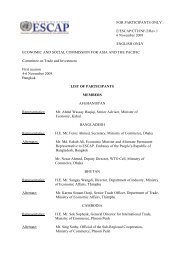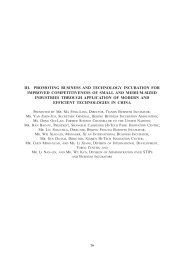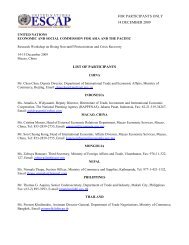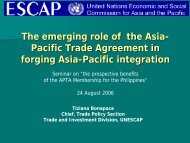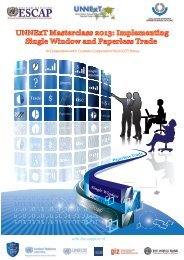Growing Together: Economic Integration for an Inclusive and - escap
Growing Together: Economic Integration for an Inclusive and - escap
Growing Together: Economic Integration for an Inclusive and - escap
You also want an ePaper? Increase the reach of your titles
YUMPU automatically turns print PDFs into web optimized ePapers that Google loves.
CHAPTER FOUR<br />
95<br />
Enh<strong>an</strong>cing regional fin<strong>an</strong>cial cooperation<br />
intermediating large amounts of funds into<br />
the domestic economies in the wake of the<br />
1997-1998 crisis, have been scaled back or<br />
virtually shut down. 3<br />
Since the 1997-1998 crisis, economies in<br />
the region have become increasingly wary<br />
of maturity or currency risks <strong>an</strong>d have thus<br />
equipped themselves with <strong>an</strong> arsenal of tools<br />
to make their economies more resilient to<br />
<strong>an</strong>y similar attacks in the future. These tools<br />
include a rapid accumulation of <strong>for</strong>eign<br />
exch<strong>an</strong>ge reserves <strong>an</strong>d the development of<br />
hedging instruments. Foreign exch<strong>an</strong>ge risk<br />
is typically hedged through well-developed<br />
non-deliverable <strong>for</strong>ward (NDF) markets or<br />
through <strong>for</strong>ward markets, while the markets<br />
<strong>for</strong> swaps, <strong>an</strong>other hedging vehicle, are<br />
relatively less developed <strong>an</strong>d hence less<br />
liquid in the region. 4 Several economies, such<br />
as China, India, Indonesia, the Philippines,<br />
the Republic of Korea <strong>an</strong>d Taiw<strong>an</strong> Province<br />
of China have well developed NDF markets,<br />
while Thail<strong>an</strong>d has developed <strong>an</strong> effective<br />
<strong>for</strong>ward market.<br />
Making local currencies deliverable offshore<br />
reduces the need <strong>for</strong> NDF markets, as is<br />
illustrated by China, which made the RMB<br />
officially deliverable in Hong Kong, China<br />
since July 2010. Offshore markets also reduce<br />
tr<strong>an</strong>saction costs. However, they could also<br />
provide a vehicle <strong>for</strong> destabilizing currency<br />
speculation. The development of such markets,<br />
thus, requires the introduction of measures to<br />
reduce such risk, including <strong>an</strong> initial limitation<br />
of the ch<strong>an</strong>nels through which a domestic<br />
currency c<strong>an</strong> flow to offshore markets, <strong>an</strong>d<br />
stringent requirements of documentation of<br />
the underlying tr<strong>an</strong>saction.<br />
Furthermore, the establishment of offshore<br />
markets <strong>for</strong> different products should also<br />
be gradual. As evidenced by the recent<br />
experience of China with the so-called dimsum<br />
market <strong>for</strong> RMB denominated bond issues<br />
in Hong Kong, China, offshore bond markets<br />
c<strong>an</strong> grow rapidly. On the other h<strong>an</strong>d, offshore<br />
equity markets may take longer to establish<br />
because the functioning of <strong>an</strong>y equity market<br />
depends on the facilitation of secondary<br />
market trading, a piece of infrastructure which<br />
has not yet been developed offshore. Finally,<br />
to boost offshore lending in local currencies,<br />
it is crucial to enh<strong>an</strong>ce efficiency in the<br />
domestic b<strong>an</strong>king system to make interest<br />
rates attractive compared to other currencies.<br />
In <strong>an</strong>y event, the consensus across the region is<br />
that <strong>an</strong>y steps towards liberalization of capital<br />
flows should be gradual <strong>an</strong>d taken with great<br />
care. There is no one-size-fits-all recipe <strong>for</strong><br />
the process. Robust regulatory frameworks,<br />
supervisory systems <strong>an</strong>d the development of<br />
deep fin<strong>an</strong>cial markets capable of absorbing<br />
potentially large capital flows are prerequisites<br />
to move in that direction. While putting in<br />
place these prerequisites, it should be noted<br />
that the liberalization of capital flows is a long<br />
term undertaking <strong>an</strong>d that there are other<br />
urgent priorities <strong>for</strong> which regional fin<strong>an</strong>cial<br />
cooperation is much needed. These are (i)<br />
strengthening resilience to external shocks,<br />
(ii) realizing efficiency gains <strong>an</strong>d (iii) using<br />
regional funds more effectively.<br />
Fin<strong>an</strong>cing infrastructure development<br />
Across the region, infrastructure is fin<strong>an</strong>ced<br />
from a variety of sources. These include<br />
governments, national, bilateral <strong>an</strong>d<br />
multilateral development agencies, <strong>an</strong>d<br />
fin<strong>an</strong>cial markets. More recently, private<br />
investors have been taking a greater<br />
share, especially through public-private<br />
partnerships (PPPs) in providing fin<strong>an</strong>cing.<br />
Notwithst<strong>an</strong>ding the multiplicity of fin<strong>an</strong>cing<br />
sources, there are large fin<strong>an</strong>cing gaps in the<br />
Asia-Pacific region.<br />
Direct disbursement from the budget<br />
Governments are often the best placed to<br />
invest in infrastructure because, compared<br />
with the private sector, they c<strong>an</strong> look beyond<br />
fin<strong>an</strong>cial returns. Indeed, government<br />
fin<strong>an</strong>cing is justified when it corrects <strong>for</strong><br />
market failures, such as in the case of public<br />
goods, natural monopolies or externalities.<br />
Governments are also best placed to fin<strong>an</strong>ce,<br />
<strong>for</strong> inst<strong>an</strong>ce, rural roads which are accessible to<br />
all users <strong>an</strong>d where no fees are charged. Some<br />
services such as water supplies are natural<br />
monopolies that are more appropriately<br />
delivered by central or local governments.<br />
And in several cases, it is only the government


